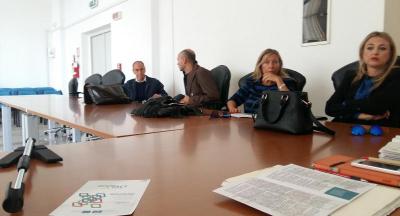Bari
*Disclaimer: The information and views set out in this page do not necessarily reflect the official opinion of the Council of Europe and/or the European Commission. Neither the Council of Europe, the European Commission nor any person acting on their behalf may be held responsible for the use which may be made of the information contained therein.
Last update 27/10/2016
Bari is the capital of the Apulia region of Southern Italy. According to the latest census data, the municipality has a total population of just over 320.000 and according to local estimates Bari is home to around 350 Roma people. The Roma population in Bari is spread out into six distinct areas on the outskirts and in the city. Japigia is the only legal settlement which was donated by the City Council to a Roma NGO and it houses roughly 46 Romanian families with approximately 130 residents, 20 of which are children. The families live in shacks, trailers or containers. An NGO helps to manage the families’ payments for services such as cleaning and security for the community. The families here share two water-closets and two showers. In Japigia the Roma community are assisted by a Roma mediator who was formally trained under the ROMED Programme. During the early 21st century, Roma families from Suceava, Romania settled in an olive grove close to the city in an area commonly referred to as S. Candida. People living in this area are exposed to extreme risks as they have built shacks on a floodplain and they have experienced severe flooding over the past few years. Roma families are also living in shanty housing in Strada Cannone in the S. Giorgio district, via Brigada Regina, via Bruno Buozzi, s. Nicola dei Bosniaci, near the Majestic Hotel. Most of the Roma population of Bari come from Romania, but there are also Albanian and Bosnian Roma families who are mostly found in the S. Giorgio district. With assistance from the ROMACT facilitator we have mobilised members of the Roma community with particularly positive results from Japigia and S. Candida.
All of the monitored Roma dwellings in Bara are shacks made of recycled wood and plastic with the exceptions of Japigia where some of the families live in trailers or containers and in S. Giorgia where three abandoned houses in poor repair are occupied by families living there.
In Japigia there is an "Artisan" cooperative where Roma workers find temporary employment for flat refurbishments, some of the families here have been able to create their own enterprises. However, these individuals and enterprises struggle to find sustainable opportunities as they do not have the skills to participate in public calls.
The ROMACT Process
The Mayor of Bari signed the Letter of Commitment in November 2015 which began the ROMACT programme in the municipality. The Community Action Group (CAG) includes Roma citizens from the areas of Japigia and S. Candida and was formed with the assistance of the ROMACT facilitator in February 2016. The CAG began their work by defining the most pressing needs of the community:
| Short-term priorities of the CAG | Objective 1 | Objective 2 | Objective 3 |
|---|---|---|---|
| Employment | Facilitate access to a flea market to Roma families | Provide training to Roma entrepreneurs on responding to public calls | |
| Housing | Seek more sustainable housing solutions | increase the number of toilets and lavatories | Solving emergency housing issues for Roma living in S. Candida |
| Infrastructure | Extension of the sewerage system | ||
| Other | ultural space for young and for women to support creativity expression and cultural activities |
The cooperation with stakeholders at local level, through the ROMACT process, continues. On 11-12 May 2016, a workshop was organised in the municipality to discuss the draft Local Action Plan (LAP) and measures that the CAG would like to have included. The Local Action Plan was finalised on 25 October 2016 and presented in a public session before being sent to the Local Council for final adoption.

